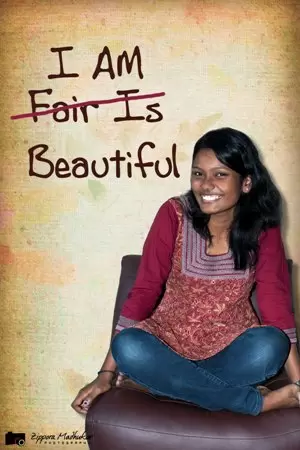She faced taunts and discrimination because she was dark but today she faces a bright future

12-April-2013
Vol 4 | Issue 15
Hearing shrieks of laughter, I looked up to see a bunch of young people laughing good-naturedly at their friend. I smiled as I looked at their faces which were so full of mirth and mischief.
My eye was drawn to the chirpy, confident, third-year college student, Monisha, whose face was lit up with genuine happiness. Her life story, still percolating in me, had left me astounded.
 |
|
Chirpy and confident: Monisha
|
Looking at her now, one would never believe that she had faced challenges of any kind, but her young life had been riddled with self-esteem pot-holes and ditches.
Born in a family that already had enough on its plate, Monisha was an un-welcomed addition. Having found out that the man she was to marry was schizophrenic on the day of her marriage Monisha’s mother had struggled and hoped that the birth of their first child would change things.
However, when there was no change in the relationship, a second pregnancy was more that what this young mother had bargained for. With a sense of purpose,
Monisha continues to recount the story of her mother considering abortion to end her life before it could even start. After a change of heart Monisha was born, but the rejection continued.
Monisha was not only the second girl baby – but she was also dark-skinned. Her grand-parents and the aunts and uncles only had pity to offer the mother because adding to caring for her husband, she now had to raise two daughters, and it would definitely be difficult to marry the second one off, they assumed.
While growing up, Monisha was taken care of by her extended family, as her mother had to work. She was constantly taunted and treated differently because of her skin colour. They would call her kali in Oriya, meaning ‘black’.
Monisha’s sister looked very different and was fair-skinned, so she was not subjected to any of the name-calling.
Monisha’s relatives would constantly nag her mother to save money for a large dowry, because this girl would definitely need a lot of money due to her dark skin.
 |
|
Monisha heard about the ‘Dark is Beautiful’ campaign after she came to Chennai
|
As she was telling me the story, I found it hard to believe that this friendly young girl had problems being sociable because of her skin colour. It made me angry to think that even as a child, she didn’t stand a chance against what society said was ‘beautiful’.
For Monisha, a lot of her self-acceptance had to do with her faith in God and her realization that, if God could make her one way, who was she to say that He didn’t make her beautiful. Friends have also been a constant source of encouragement and strength. Monisha slowly learnt to accept her skin colour and also be proud of it.
Recently, at a family gathering, Monisha’s aunt apologised to her for treating her differently because of her skin colour. That was a significant moment in her life, because the family realised and acknowledged that they had been wrong.
When Monisha came to Chennai to study, she heard about the ‘Dark is Beautiful’ campaign, which was initiated by Women of Worth, and she knew she wanted to be a part of that campaign. Being more confident in who she is now, she wants to tell people around her that there is no such thing as a ‘perfect’ woman.
We are unique; our strengths, our weaknesses, our quirks, our personalities, and our flaws make us who we are. She wants to tell others who struggle in finding their identity that they need to be the best they can be, not the best that society wants you to be.
 |
Have you heard of ‘Moon Flowers?’ These flowers are rare because they bloom at night. When thinking about Monisha’s story, I thought of these flowers.
Just like these flowers, who have bloomed in spite of not being in the sun, girls like her have bloomed from insecure, angst-ridden young girls to confident, self-assured young women in spite of the discouraging words and attitudes of those around them.
Rising above the insults and the slurs, she has blossomed into a fun, cheerful young woman of substance; ready to help others around her, while her past insecurities fall from her young shoulders and lay in shards at her feet.
Monisha’s story has made me think about the importance of the words we speak to young children. Being adults, we have the natural responsibility of being examples to those younger than us – whether we like it or not!
Wouldn’t it be amazing if our generation could instil confidence and hope in the generations to come?
Let us look forward to the young people of India, who will join together and build a better future for the generations to come, without being unfairly treated because of something they cannot change – the colour of their skin.
If we choose to, we can put our hearts and minds together and stop this issue of Colourism, or ‘Fairness Bias’.
The writer is a stay-at-home mom who has recently started a photography business. As a resource person for Women of Worth, she will be using her photography to tell the stories of struggles and triumphs of various dark skinned women.
















